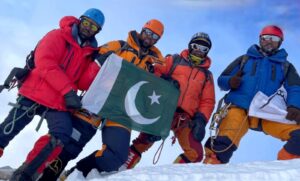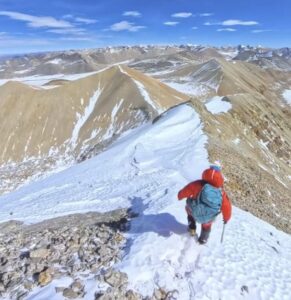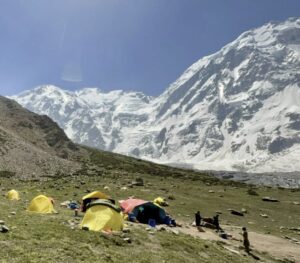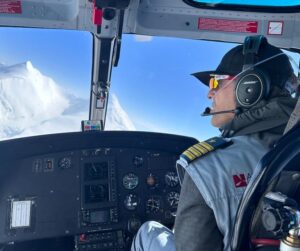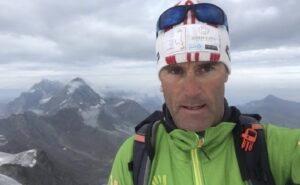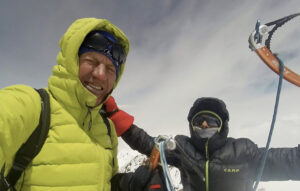Denis Urubko and Maria Cardell celebrated their sixth anniversary on a 5,975m summit in the Shigar Valley. “Locals say it was unclimbed but we are digging for further reports,” Cardell said. Denis Urubko has asked the international climbing community for info on any previous climbs.
Urubko and Cardell went by vehicle to 2,400m, then walked for two days, heavily loaded and alone, “looking for trails, terrain, water,” says Urubko.

There’s plenty of room for exploratory climbing in Pakistan, including some valley just a couple of days away from Skardu. Photo: Maria Cardell
The climb
“We climbed a technically easy ridge and a mixed 40-45º couloir. [Then we] arrived on the peak’s shoulder at 5,450m, under light snow,” Urubko wrote. “The weather on June 13 was good and we started at 4:30 am in crushingly deep snow, up the avalanche-risky slopes.
“At one icy plate of about 45′, I fixed a screw and Maria belayed me. At once, I broke a huge cornice and flew down a couple of metres, but Maria held me on the rope.”
They summited at 8:30 am. “Some holes between clouds let us see Rakaposhi, Broad Peak, [and] Khosar Gang.”

Denis Urubko during the ascent. Photo: Maria Cardell
As for the possible first, if no previous climb turns up, the couple will look for a suitable name. “People around here are already calling it Urubko Peak,” the Kazakhstan-born climber wrote.
However, they want to name the mountain after the village below it, Kashmal. “The shepherds were warm and welcoming, and we had a very positive relationship with them,” they wrote.
How to name a mountain in Pakistan
In Pakistan, climbers achieving a first ascent can apply to name the peak. First, they must fill out a formal application, which goes through several departments that may eventually agree to and register the new name.
“Authorities must study the question and first of all, make sure that the mountain doesn’t have a local name,” Karrar Haidri of the Pakistan Alpine Club told ExplorersWeb.
If no previous name appears, authorities then decide if the new name is okay. In Urubko’s case, “they should apply at the local department, i.e., the Deputy Commissioner at Shigar or to Skardu’s Commissioner,” Karrar Haidri said.
Still quiet on the 8,000m front
Most climbers eyeing Pakistan’s 8,000’ers this season are already in Pakistan, on their approach trek or in Base Camp. Lack of cell phone coverage limits communication, especially around Nanga Parbat. Not everyone carries an InReach device. Tunc Findic of Turkey, for example, warned us that he might be offline for about 40 days. “Hopefully, you’ll get good news from me in July,” he said.

Tunc Findic with Nanga Parbat in background. Photo: Instagram
Other climbers delegate friends and relatives to update their social media, based mainly on outfitters’ sporadic updates.
Those in the Karakoram might get luckier: A cellular antenna installed last year seems still to work, at least intermittently.
Pakistani operators only provide logistics until Base Camp. Beyond, guided climbers rely on their outfitters, typically the same that they use in Nepal.
Those pursuing multiple 8,000’ers this summer are sticking with their familiar Nepali personnel. Grace Tseng is back with Dolma Outdoor’s Nima Gyalzen, Kristin Harila climbs again with Pasdawa and Dawa Ongchu of 8K, Adriana Brownlee and Gelje Sherpa are back with Seven Summit Treks, and Sanu Sherpa will try to complete his double-14×8,000’er project with the Pioneer Adventure team, led once again by Mingma Dorchi.
Elite Exped is also in Pakistan, heading for K2 with Andorra’s Stefi Troguet and apparently Sajid Sadpara. Troguet, supported by the Nimsdai Foundation, aims to climb K2 and Broad Peak without supplementary O2.

Stefi Troguet, ready to go. Photo: Stefi Troguet

